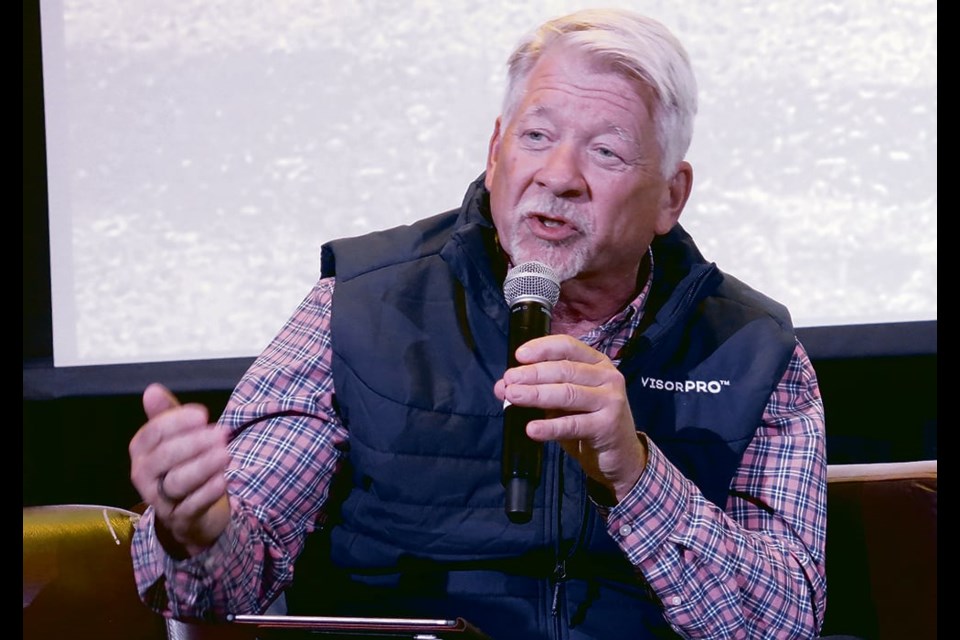WESTERN PRODUCER — A documentary promoting regenerative agriculture as the solution to what it sees as a global threat caused by the impact of farm chemicals on soil health is at times misleading and simplistic, said an agrologist.
It isn’t a good idea to regard a single type of agriculture as a silver bullet for something as complicated as the environment, farming and food production around the world, said Robert Saik, chief executive officer of AGvisorPRO.
He attended the Alberta premiere of Common Ground, which is a new, 105-minute American documentary narrated by Hollywood actors such as Woody Harrelson and Jason Momoa. It was shown Nov. 16 at Olds College as part of Striving for Common Ground, a six-hour event about regenerative agriculture that included a panel discussion involving Saik.
“I think regenerative agriculture is a wonderful conversation because it focuses attention on soil health,” he said during an interview.
“And I’ve been doing agronomy for, what, 30 to 40 years, and at the end of the day, it’s all about soil health, and I think there’s many ways to get there.”
He pointed to Sri Lanka, which abruptly forced its farmers to go organic after banning synthetic fertilizer and pesticide imports in 2021. Food production plummeted and prices soared after yields of crops such as rice declined, deepening an economic and social crisis that forced Sri Lanka’s president to flee the country.
“I think we have to be careful about making those really blanket statements,” said Saik.
“If the world was to go into organic production, how much more land would we have to put into production? How much more rainforest would we have to cut down? These are the questions we need to be asking.”
However, improving soil health through regenerative agriculture is vital not only to farmers but also to the entire agrifood supply chain including processors and consumers, Jason Bradley, president of Regener8ve Ag Inc., said during an interview. He helped organize the Striving for Common Ground meeting in Olds, which was attended by more than 200 people.
“People are becoming aware of the fact that soil health has been degraded … and so, by having an event that focuses on soil health and regenerative agriculture, we can start to discuss what are some of the major problems, and what are some of the solutions that especially farmers can bring forth toward soil health?”
Although the invention of synthetic inputs such as nitrogen fertilizers significantly boosted crop yields, they also led to an expensive, chemical-based industrial model for agriculture that depleted soil, said Bradley. Farmers didn’t realize how much they were not only mining carbon out of their soils but also mining the biological value by affecting organisms such as beneficial soil bacteria and fungi, he said.
He described regenerative agriculture as a nature-based system that revitalizes soil by taking advantage of how things such as plants, animals, soil, water and air work together. The goal is to improve the biological health of soils while avoiding synthetic inputs, in turn maintaining and even increasing yields and profitability, he said.
Common Ground is the sequel to Kiss the Ground, a documentary released in 2020 about using regenerative agriculture to improve carbon sequestration to fight climate change. Both movies were directed by American filmmakers Rebecca and Josh Tickell, with Common Ground winning the Human/Nature Award at this year’s Tribeca Film Festival in New York.
Although Saik praised Common Ground’s initial depiction of how soil health worked, he questioned the factual basis of several of its subsequent statements.
“One of the quotations was that species are going extinct now faster than when the dinosaurs went out,” he said.
“Explain that to me and substantiate that statement. It was just stated like it was a fact. Well, nobody knows that.… This is the problem with Hollywood and agriculture.”
The film also made what Saik called unsubstantiated claims linking glyphosate herbicides to human illnesses such as amyotrophic lateral sclerosis (ALS), formerly known as Lou Gehrig’s disease.
“If I was in the audience (as a consumer) and I saw this for the first time, it would create fear of
Although it has been the focus of civil litigation, glyphosate is among the most tested agricultural molecules in the world and has been approved by numerous health agencies, he said.
The management of chemicals by Canadian farmers has tremendously improved compared to 40 or even 20 years ago, said Greg Paranich, agricultural field specialist with the Grey Wooded Forage Association in Alberta.
“The technology for application is remarkable now for precision, and for accuracy and for placement and for safety.”
Although Common Ground got off to a good start, “all of a sudden, they got pretty Hollywood and it was now, we’ve got almost the infomercial … and that’s where it just lost a lot of credibility for me,” he said.
The documentary paints a misleading portrait of modern agriculture as 小蓝视频 out to destroy the soil, said Mackenzie Fingerhut, a farmer and recent Olds College graduate from Fairview, Alta., whose operation is transitioning to a more regenerative approach.
“Without my soil, I don’t produce any canola to sell, or wheat or peas or anything, so I think there’s some good messaging in (the film) for people who understand it. However, I would be concerned that consumers might be simply misled by it to the point of becoming more hostile towards modern agriculture.”




